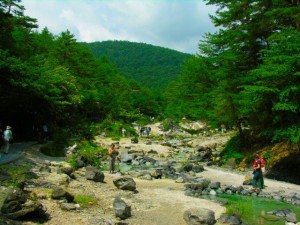
According to the “White Paper on Tourism in Japan, 2013” (“State of Tourism in FY 2012” and the “Tourism Policy in FY 2013”), trading volume of travel industry was 6.29 trillion yen, which is 36.6% decrease compared with 9.92 trillion yen of 1996. Of those, overseas travel decreased 32.6% from 4.06 trillion yen to 2.74 trillion yen, and domestic travel decreased 40.0% from 5.81 trillion yen to 3.49 trillion yen. Trading volume of lodging industry peaked in 1991with 4.94 trillion yen, but in 2011, it decreased by 45.3% to 2.70 trillion yen. Trading volume of both travel and lodging industries are decreasing every year.
Both travel and lodging industries in Japan differ very much compared to their worldwide counterparts in scale of operation and in business expansion. Many international travel industries focus effort on online sales, many corporatize lodging and transportation and engage in multidirectional operations and operate in larger scale than major Japanese travel agencies. Japanese lodging industries operate mainly domestically, but major international hotel enterprises operate global chains.
Also, tourism industry is relatively popular among the graduating employment seekers, but is not so popular among career changers because of the working hours and the wage standard of the business. Furthermore, the proportion of the college graduates majored in tourism related departments employed in tourism business accounts for only 16.1%.
Based on these present situation and issues of the tourism industries, the White Paper cites tourism policy enhancing the role of the tourism industry which is the leader of the tourism. “Tourism Industry Policy Committee” founded in September 2012 proposed 6 measures to be taken for the enhancement of the tourism industry. Tour operator certification system to be founded, various existing systems of the industry to be revised and installation of free public wireless LAN to the accommodations are some of the measures included.
Finally, the White Paper on Tourism states that in order for Japan to swiftly become an advanced country in tourism, the tourism industry should play a major role to fulfill the expectations of the public. It concludes that Japan’s tourism industry itself needs to contemplate its issues, ideals and possibility of changes, and it is urged to put much effort into enhancing the industry to take a leap forward to become the world’s best and the most advanced tourism industry.
【6 proposals made by the Tourism Industry Policy Committee】
1. To establish a “brand” that represents Japan in the international tourism industries by improving and sustaining the quality of tourism services
2. To venture into the advanced tourism business
3. To improve and upgrade management and productivity in the lodging industry
4. To ensure the safety of tourist travel
5. To correspond to up-to –date events such as advancement of IT technology
6. To nurture and acquire excellent human resources in the tourism




